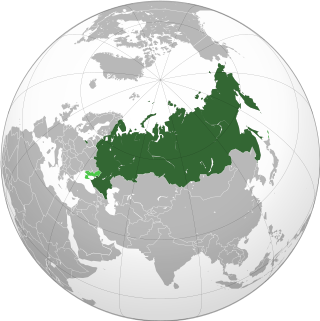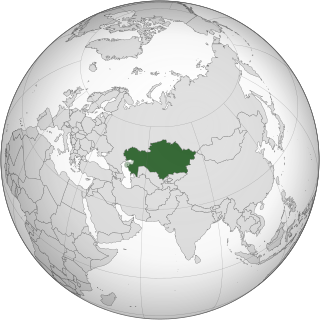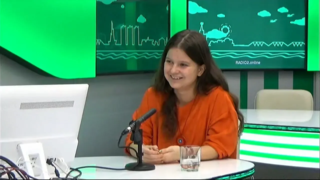The sale of certain books said to contain LGBT-related themes are restricted in Russian bookstores due to the Russian gay propaganda law. [1] [2] The formal name of the list is "Register of goods containing banned information (LGBT+)". [3]
Among the more than 250 titles are works by Plato, Boccaccio, Virginia Woolf, Fyodor Dostoevsky, Stephen King, Haruki Murakami, Marcel Proust, Oscar Wilde, and Stefan Zweig. The publication of the list caused a wide public outcry. [4]
Manifestations of LGBT book censorship have happened before, [5] but the existence of the list became known on February 20, 2024, although it was compiled as early as December 2022. Representatives of the authorities, including deputy Alexander Khinshtein, tried to disavow the list, despite the fact that various representatives of the book market confirmed its existence. [6] [7] [8] Another MP, Aleksandr Sholokhov, expressed support for the list. [9]

Lesbian, gay, bisexual, transgender, and queer (LGBTQ) people in Russia face severe legal and social challenges not experienced by non-LGBTQ residents. Although sexual activity between consenting adults of the same sex is legal, homosexuality is disapproved of by most of the population and pro-LGBTQ advocacy groups are deemed "extremist" and banned. It is illegal for individuals to "promote homosexuality" and same-sex couples and households headed by same-sex couples are ineligible for the legal protections available to opposite-sex couples. Russia provides no anti-discrimination protections for LGBTQ people and does not have a designation for hate crimes based on sexual orientation and gender identity. Transgender people are not allowed to change their legal gender and all gender-affirming care is banned. There are currently no laws prohibiting discrimination based on gender identity or expression, and recent laws could be used to discriminate against transgender residents.

Lesbian, gay, bisexual, and transgender (LGBT) people in Kazakhstan face significant challenges not experienced by non-LGBTQ residents. Both male and female kinds of same-sex sexual activity are legal in Kazakhstan, but same-sex couples and households headed by same-sex couples are not eligible for the same legal protections available to opposite-sex married couples.

The Federal Service for Supervision of Communications, Information Technology and Mass Media, abbreviated as Roskomnadzor (RKN), is the Russian federal executive agency responsible for monitoring, controlling and censoring Russian mass media. Its areas of responsibility include electronic media, mass communications, information technology and telecommunications, supervising compliance with the law, protecting the confidentiality of personal data being processed, and organizing the work of the radio-frequency service.
The Russian LGBT Network is a non-governmental LGBT rights organization working for the social acceptance of and protection of the rights of LGBT people in Russia. Founded in 2006, it was reformed into the first Russian inter-regional LGBT rights organization on October 19, 2008. The organization is a member of the International Lesbian and Gay Association (ILGA) and is led by Russian LGBT rights activist Igor Kochetkov.
The Belarusian LGBT Human Rights Project GayBelarus is a national youth civic association. They operate the Jáhada positive queer infoportal.
In the Russian Empire, government agencies exerted varying levels of control over the content and dissemination of books, periodicals, music, theatrical productions, works of art, and motion pictures. The agency in charge of censorship in the Russian Empire changed over time. In the early eighteenth century, the Russian emperor had direct control, but by the end of the eighteenth century, censorship was delegated to the Synod, the Senate, and the Academy of Sciences. Beginning in the nineteenth century, it fell under the charge of the Ministry of Education and finally the Ministry of Internal Affairs.

Yelena Borisovna Mizulina is a Russian politician and lawyer. She served as a member of the State Duma between 1995 and 2003 and again between 2007 and 2015, and has been a member of the Federation Council since 2015.

For the Purpose of Protecting Children from Information Advocating a Denial of Traditional Family Values, commonly known as the Russian anti-LGBT law or as the Russian anti-gay law, is a law of Russia. It was unanimously passed by the State Duma on 11 June 2013, unanimously passed by the Federation Council on 27 June 2013, and signed into law by President Vladimir Putin on 30 June 2013.
Ultra.Kultura was a Russian counterculture book publisher.
Bookmate is a social ebook subscription service, available primarily on mobile, with catalogues in 9 languages. The mobile app is supported on iOS, Android, Windows Phone and feature phones, and the service is also available in a web version.

The free online encyclopedia Wikipedia was briefly blocked in Russia in August 2015. Some articles of Wikipedia were included into various censorship lists disseminated by the government. Further threats to block were made following the Russian invasion of Ukraine.
Censorship of LGBTQ issues is practised by some countries around the world. It may take a variety of forms, including anti-LGBTQ curriculum laws in some states of the United States, the Russian gay propaganda law prohibiting the "promotion of non-traditional sexual relationships", the Hungarian anti-LGBT law banning "content portraying or promoting sex reassignment or homosexuality", and laws in some Islamic states such as Afghanistan, Saudi Arabia, and Iran prohibiting advocacy that offends Islamic morality.

Yulia Vladimirovna Tsvetkova is a Russian artist and activist from Komsomolsk-on-Amur. She is the organizer of the activist art festival Saffron Flower and the founder of the "Woman--not doll" project which destigmatizes the female body. She is also the director of the "Merak" youth theater. On 11 February 2020, she was recognized as a political prisoner.
Maxim Sonin, is a Russian writer who has published several novels dealing with LGBTQ+ and violence with AST (publisher) and Popcorn Books. Their debut novel, The Letters till Midnight, a young adult drama, was the first Russian-language book by a major publishing house that mentioned LGBTQ-relationship in the publisher's announcement. The Letters till Midnight has become a regular target of attacks and was blacklisted in 2022 as a part of the government crackdown on LGBTQ+ community in Russia.
2022 in Russia is the 31st year of the Russian Federation.
A Summer in the Red Scarf is a coming-of-age book series co-written by a Ukrainian-Russian duo Katerina Silvanova and Elena Malisova. The series has gained significant attention for its compelling narrative and its portrayal of LGBTQ+ themes within the context of the Soviet Union. The books have experienced both critical acclaim and controversy since their publication by independent publisher Popcorn Books.

Lesbian, gay, bisexual, and transgender (LGBT) people have played a role in multiple aspects of the Russo-Ukrainian War.

Petr Alexandrovich Voskresensky-Stekanov is a Russian and German human rights and LGBTQ activist, researcher of LGBTQ history, and doctor.